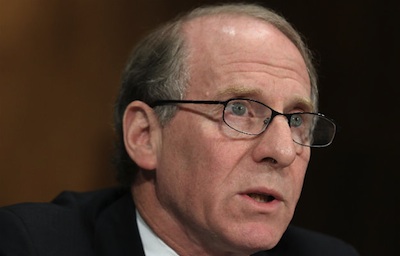
The five main Stormont Assembly parties took part in round-table talks with US diplomat Richard Haass for the first time today [Friday, September 20th] as part of discussions to deal with parades, flags and justice issues.
It is the first time since he arrived in Belfast that Mr Haass has met all the Six County Executive parties together.
This week’s talks are the first of four intensive blocks of meetings scheduled to take place each month between now and Christmas. DUP leader Peter Robinson has said he did not expect that all the issues would be cut and dried by then.
But earlier this week Mr Haass said the end of December’s final block of monthly talks is a “firm deadline”. He said his current visit to the north was to focus primarily on information gathering.
“I do not see this first set of meetings in September as a negotiating round or as an attempt to bridge differences,” he said.
“I am hoping that by the end of this trip and certainly by the end of the October trip - these first two rounds of talks - that I, and we, have an incomparably better sense of the issues and the politics behind them. That will then allow us to pivot and to move forward and to essentially narrow the differences and come up with the consensus.”
Mr Haass, who was a peace envoy to Ireland during George Bush’s presidency in 2001-03, said his recommendations would be tabled before the end of the year -- but insisted that finding a solution to the issues under discussion lay with the parties.
“We can work for it, but we cannot by ourselves make it happen,” he said.
“It is up to local leaders in the community; in the society and in the political process to be willing to put forward their ideas; to accept compromise and to try to recommend to their respective constituencies and supporters to accept and support those compromises.”
Mr Haass said he was willing to meet all groups, including loyalist protestors and Sinn Fein, but he would not say if contact would be made with other republican groups.
Although originally suggesting he would address segregation in housing and education as part of his multi-party ‘panel’ process, he later ruled that out, saying it was “still part of the reality” in the North.
The talks took place on the eve of a major march by loyalists through Belfast city centre. Up to 5,000 loyalists will march through Belfast city centre this Saturday afternoon [September 21st] after the Parades Commission allowed the major parade to go ahead. It is set to to pass Royal Avenue -- where an anti-internment march ended in serious loyalist rioting in August -- and Woodvale Parade, near the loyalist encampment, before possibly attempting to force its way into the nationalist Ardyone to complete the rerouted sectarian march from July 12th.
Elsewhere, sectarian disturbances and acts of violence have continued since the summer. A Catholic church in County Antrim was damaged after loyalists hurled a petrol bomb and white paint at its front door. The brickwork of St Mary’s Star of the Sea Church on the Shore Road, Newtownabbey was damaged in the attack, the fifth of its kind this year.
An Orange Order Hall in Drumahoe, County Derry, was robbed of two banners and a painting, and sprayed with graffiti. Nationalist youths were blamed for that incident, as well as another incident in which ‘RUC’ [police] was sprayed on the wall of a Sinn Fein office in Derry city.
Amid low expectations for the talks, SDLP leader Alasdair McDonnell said the current talks process needs to match the ambition of 1998’s Good Friday Agreement.
“It is time to deepen the values and comprehensively advance the unfinished work of the Good Friday agreement. It is time to further transform our politics and the lives of our people,” he said.
Sinn Fein’s Martin McGuinness described the talks as “crucially important”. And he said it “beggars belief” that politicians had failed to agree to build a peace centre on the former site of the Long Kesh prison camp.
During a lecture at the Warrington peace centre in England, Martin McGuinness said that the events of the past had “tripped us up.. how we speak about it, how we present it and how we address it. And its role in reconciliation.”
Last month DUP leader Peter Robinson said his party had withdrawn its support for a centre at Long Kesh following a Sinn Fein commemoration for two IRA Volunteers in County Tyrone.
Mr McGuinness said unionist fears the building would become a ‘shrine’ to the IRA had been exploited.
“The exploitation of this fear has only been possible because of our collective failure to address the past,” he said. “And in hindsight we should have known better.”
The Sinn Fein politician was speaking in Warrington by Colin Parry, the father of Tim Parry, one of two boys who tragically died in a 1993 IRA armed campaign in England.
Speaking this evening as he prepared to fly back to the US, Mr Haass said there was “a real chance” the current talks process could succeed.
“But, that is just that - a real chance is not a guarantee. Obviously it depends upon the willingness of some people to make some tough decisions and then defend them.”
![[Irish Republican News]](https://republican-news.org/graphics/title_gifs/rn.gif)
![[Irish Republican News]](https://republican-news.org/graphics/title_gifs/harp.gif)

